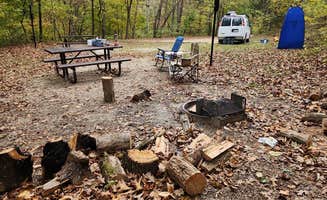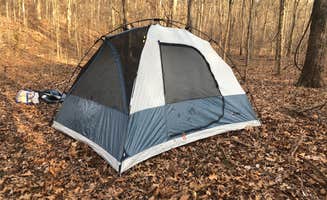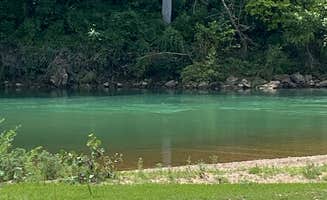Dispersed camping near Birch Tree, Missouri takes advantage of the Ozark Highland's unique terrain, with elevations ranging from 700 to 1,500 feet throughout the region. The area receives approximately 45 inches of annual rainfall, creating lush forests and clear waterways ideal for primitive camping. Most backcountry sites around Birch Tree experience significant temperature swings, with summer days reaching 90°F while nights can drop 20-30 degrees cooler.
What to do
Fishing at dawn and dusk: McCormack Lake Recreation Area offers productive fishing in a secluded setting. "A really nice place to go hang out," notes camper Glen T., who specifically recommends the "great fishing" opportunities.
Swimming in crystal-clear springs: The natural swimming areas at Blue Spring Backcountry Camping provide refreshing relief from summer heat. "This was the hottest campground I have ever been in my life. It was 109 and extremely humid... The water was very warm to swim in, and is also a good place to fish for crappie and catfish," says Eva W.
Kayaking the Eleven Point River: Whitten River Access serves as an excellent launch point for paddling adventures. According to Ralph S., "It has river access via a boat ramp and 'dock'. Our group kayaks in during trout fishing trips and have never had a problem finding a place to camp. The Eleven Point River is beautiful and cold."
Wildlife observation: Early mornings offer the best chances to spot local wildlife. "Lots of beavers in the pond. Fire wood is abundant," reports Malik H. about Little Scotia Pond. The area also supports elk herds, with one camper noting: "If you're lucky, you may see the local elk herd. They reintroduced elk in this area a few years ago."
What campers like
Privacy and seclusion: Sunklands Conservation Area provides true isolation for rustic camping near Birch Tree. "Great for those who want to be alone... We had a great time exploring the outdoors- saw no other people and only heard nature and airplanes," writes Katie B.
Waterfront camping spots: Campers appreciate sites directly on riverbanks. "There is a small designated campground above the river bank sites. Great spot to car camp," explains Anthony L. about Log Yard Campground.
Night sky viewing: The minimal light pollution creates exceptional stargazing opportunities. "Plenty of stars out at night," notes Linda C. who camped at Whitten River Access during winter.
Off-grid experience: The lack of cell service appeals to those seeking disconnection. "No cell service so you'll have to drive up the road to ellington to get anything. Overall it was a very relaxing experience," states one camper about their experience at a riverside campsite.
What you should know
Challenging access roads: Many sites require navigating rough terrain. "You have to cross a creek to get to this location. If the weather moves in, it would be wise to pack up and move out while you can," cautions Joseph A. about Log Yard Campground.
Seasonal considerations: Spring flooding can dramatically alter camping areas. "The area changes after a flood, and the campsites have to be reestablished," explains one reviewer. Winter camping requires extra preparation, with temperatures frequently dropping below freezing.
Payment systems: Some sites require fees despite their primitive nature. "To reserve for $10 per night you have to leave your things at the site and drive down to find the QR code by the bathrooms and book the site," explains Adi about Blue Spring.
Bathroom facilities: Vault toilets are available at select locations but often in poor condition. "They do have vault toilets available but they're gross," warns Jen about facilities near Noblett Lake.
Tips for camping with families
Plan for daytime activity transitions: The temperature variations mean scheduling water activities for afternoons. "It was 109 and extremely humid... The water was very warm to swim in," notes a camper about summer conditions at Blue Spring.
Pack extra drinking water: With limited potable water sources, families should bring 1-2 gallons per person per day. "Primitive campsites in all the locations along Ozark National Waterway. They are well maintained... take your water shoes, the river is awesome!!" advises Shelly S.
Consider weekday visits: Cane Bluff River Access and other popular spots get crowded on weekends. "It's way back on a little dirt road past some farm land and homes. Only a few campsites... didn't see another camper all weekend," reports Elaina M.
Prepare for limited facilities: Most sites offer minimal amenities. "Just be aware you will not have cell service," warns Hannah W., highlighting the importance of bringing all necessary supplies.
Tips from RVers
Size restrictions: Large RVs struggle on most access roads to primitive sites. "The road in is rough gravel and a big rv will be slow going. However, I've seen so good size rv's there," notes Ralph S. about Whitten River Access.
Ground conditions: Parking surfaces vary significantly by season. "Found a level spot by the river, ground was frozen or it would have been muddy," shares Linda C. about winter camping.
Generator etiquette: In the quiet backcountry, generator noise carries far. "The only annoying thing was that when I stayed with my tent on the rocks by the water, all the way at the end, I could still hear the person at the very first campsite with RV generator humming very loudly and it took away a lot of the ambiance of the place," explains one tent camper at Little Scotia Pond 4x4 Dispersed Site.
Avoid soft terrain: Muddy conditions can strand vehicles. "Beware! The gravel settles if wet and many trailers and campers have gotten stuck here. 4wd is recommended," warns Dave N. about shoreline camping.




